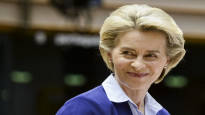STRASBOURG Chairman Ursula von der Leyen career in the management of the European Commission has been on the upswing.
The German is at the height of his power as he delivers his fourth and possibly last policy speech to the European Parliament meeting in Strasbourg.
In the speech, von der Leyen lists the achievements of his four-year term and the future challenges of the European Union.
There is enough work to do: Ukraine is hoping for weapons from the EU, funding for reconstruction and the start of EU membership negotiations.
At the same time, the EU has to think about increasing its own weapons production, and ways to cover the EU’s increased financial needs.
The personal career goals of the chairman are also discussed in the corridor discussions. Is von der Leye aiming for a second five-year term at the head of the Commission?
Conditions for the extension period are good. In four years, von der Leyen has created a strong position for himself in the European Commission, which wields great power.
In international contexts, von der Leyen is generally considered to be the number one leader of the EU. Economic magazine Forbes listed von der Leyen as the most powerful woman in the world last year.
Von der Leyen’s shares have been raised both by the brutal handling of the corona crisis and the war in Ukraine, which has demanded unprecedentedly fast and strict actions from the EU.
His crown jewel, however, can be considered the EU’s green transition, which is supposed to make the EU carbon neutral by 2050.
The implementation of the green transition has been widely praised, especially in the EU’s political middle groups and the left.
Background discussions emphasize the importance of von der Leyen’s personal contribution to the implementation of the green transition.
Von der Leyen’s position as a strong EU leader however, was not written in the stars.
The former defense minister, who gained wings in German domestic politics, was appointed to the head of the commission as a surprise name after the 2019 European elections.
Von der Leyen’s choice was primarily influenced by the German chancellor Angela Merkel and the President of France Emmanuel Macron.
In Germany, von der Leyen was known as Merkel’s trusted and close partner. Macron, on the other hand, is said to have hoped for von der Leyen to be a weak leader who would adapt to France’s wishes.
Macron’s wish did not come true. Von der Leyen has led the commission with a steady hand during her period tinged with crises.
Von der Leyen has also had to struggle for her position at the top of EU politics. His first challenge was the vote of confidence held by the EU Parliament in 2019, which he barely survived.
There has been opposition also in von der Leyen’s own political group, the center-right EPP.
The group leader who also aspired to the chairmanship of the commission Manfred Weber has challenged von der Leyen’s line within the EPP group.
An example of this was seen recently when the EPP group tried to overturn the controversial restoration regulation in the European Parliament.
However, the restoration decree was passed despite the EPP’s protests.
The position of the EPP group is decisive, if von der Leyen wants a second term at the head of the Commission.
A further term would possibly require von der Leyen to run for the EU elections as the EPP’s top candidate.
The European Parliament has demanded that the president of the Commission be chosen from among the leading candidates known in advance in connection with the European elections.
However, it is also possible to circumvent the top candidate procedure, as von der Leyen’s election in 2019 shows.
Ursula von der Leyen has made a declaration about their future plans. There will be no announcement about running for office in tomorrow’s policy speech either.
The consideration will surely also be influenced by whether the 64-year-old von der Leyen, who works long hours, wants to continue working for the Commission until he is seventy.
Of course, there are alternatives. Ursula von der Leyen has also been arranged for the Norwegian position of Secretary General of NATO Jens Stoltenberg successor.
The approaching personal choices are electrifying Brussels politics. The nomination process is closely monitored in Finland as well.
The commission, which supervises compliance with treaties and legislation, has been described as the security of a small country in the European Union, which consists of large and small countries.
The composition and program of the next commission is therefore of great importance to Finland as well.
What thoughts did the story evoke in you? You can comment on the topic until Thursday, September 14 at 11 p.m.
